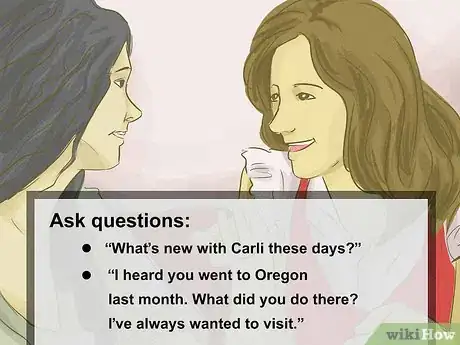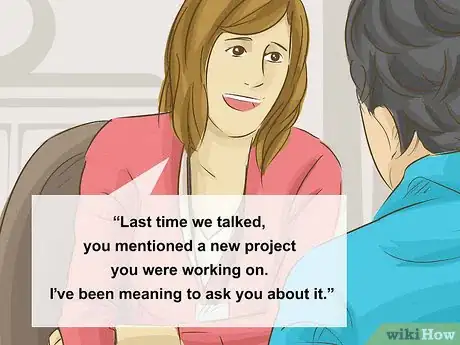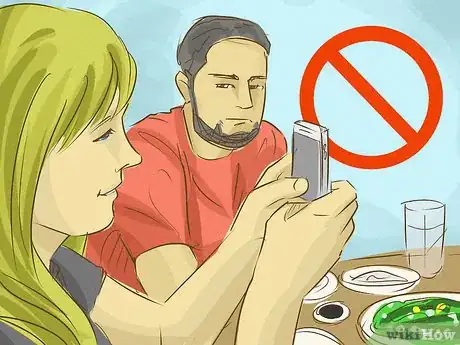This article was co-authored by Lynda Jean. Lynda Jean is an Image Consultant and the Owner of Lynda Jean Image Consulting. With over 15 years of experience, Lynda specializes in color and body/style analysis, wardrobe audits, personal shopping, social and professional etiquette, and personal and business branding. She works with clients to enhance their image, self-esteem, behavior, and communication to facilitate their social and career goals. Lynda holds Bachelor degrees in Sociology and Social Work, a Master’s degree in Clinical Social Work, and a Certified Image Consultant (CIC) certification. She studied Image Consulting at the International Image Institute and the International Academy of Fashion and Technology in Toronto, Canada. Lynda has taught Image Consulting courses at George Brown College in Toronto, Canada. She is the co-author of the book, “Business Success With Ease,” where she shares her knowledge about, ‘The Power of Professional Etiquette.’
There are 13 references cited in this article, which can be found at the bottom of the page.
wikiHow marks an article as reader-approved once it receives enough positive feedback. This article has 34 testimonials from our readers, earning it our reader-approved status.
This article has been viewed 5,590,182 times.
Making conversation can be difficult. Sometimes you feel shy, or maybe you don't have much in common with the person you're talking to. Learning to become a good conversationalist is not as difficult as you may imagine, but it does require some practice. Whether it's at a dinner party, at your school, or over the phone, good conversations start when 2 or more people feel comfortable talking with each other. There are several steps you can take to learn to relax and have a great conversation with practically anybody.
Steps
Starting the Conversation
-
1Perfect your timing. Timing is key to starting a great conversation. No one likes to be interrupted if they are busy or preoccupied. When you are trying to start a conversation, keep in mind that timing is key. If you need to have an important conversation with your boss, for example, try scheduling time in advance to talk. This will ensure that you both have the time to devote to having a productive conversation.[1]
- Timing is also important for impromptu conversations. Maybe you have been looking for a way to meet your new neighbor. You probably don't want to strike up a conversation if they are entering the building soaked with rain, looking exhausted, and carrying a bag of take-out food. At this point, a simple, "Hi, how are you?" will suffice. You can save getting to know one another for a better time.
- If someone is making eye contact with you, it might be a good time to strike up a conversation. For instance, if you are browsing in a bookstore and the person next to you glances over frequently to see which book you are considering, try talking to them. You could say, "This one looks interesting. Do you like biographies?"
- If you want to talk to your husband about adopting a new puppy, make sure to approach him at a good time. If you know he's not a morning person, don't bring up the subject before he has had his coffee and a chance to wake up.
-
2Comment on your surroundings. Having spur of the moment conversations is an excellent way to improve your skills as a conversationalist. Take some time each day to try to start a conversation with someone you encounter in your everyday life. For example, you could try talking to the person in line behind you at your local coffee shop. Make a comment or ask a question about your surroundings. This will seem natural and is a great way to start talking.[2]
- Try saying, "I love the coffee here. What's your favorite roast?". This shows that you are interested in talking and you are beginning the conversation in a completely natural way.
- Strike a positive tone. Offering a cheerful comment is usually more effective than saying something negative. You could say something like, "Isn't this weather great? I love when it's cool enough to wear sweaters."
Advertisement -
3Remember people. Many of us encounter a very large number of people each day. Whether you work for a large company, or simply see a lot of people in your neighborhood or at your child's school, it can be difficult to put the right face with the right name. However, research shows that making a point to not only remember people's names, but to call them by name can help increase the personal connection between you.[3]
- When you first learn someone's name, repeat it in conversation. When someone says, "Hi, I'm Emily", you should say, "It's nice to meet you, Emily." The immediate repetition will help you imprint the name in your memory.
-
4Offer a compliment. Saying something nice is a great ice-breaker. Most people respond positively when you offer them a compliment. Try to choose something specific to comment on, and make sure that you are being sincere. Your tone of voice and facial expressions often convey your thoughts, so make sure you are being honest in the compliment.[4]
- Try saying something encouraging to a co-worker whom you would like to know better. You could offer a statement such as, "I really admire the way you delivered that presentation. Could you give me some tips on how to organize an effective pitch?"
- This type of statement not only starts the conversation on a positive note, but you are opening the door for follow-up.
Being an Active Participant
-
1Ask good questions.[5] It takes at least two people to have a great conversation. Make sure to do your part and actively participate in the discussion. One of the best ways to do this is to ask questions that will allow the discussion to develop naturally.[6]
- Ask open-ended questions. Instead of saying, "It's a nice day, isn't it?" Say, "How are you planning to enjoy this beautiful weather?" The first example only requires a yes or no answer, which could be a dead end for the conversation. Ask questions that require more than 1 word.
- Ask questions that clarify what the other person is saying. If you are having a talk about rules with your teenager, try saying, "I hear you saying that you're frustrated because you feel like you don't have enough freedom. What can we do to find a solution that works for both of us?"
-
2Practice being an active listener.[7] Being an active listener means that you are responding to your conversation partner and demonstrating that you are engaged in the discussion. You can indicate that you are actively listening through both physical and verbal cues. Active listening makes the other person feel valued and respected, which is very important when trying to develop effective conversations.[8]
- You can let someone know that you are listening by using positive body language. Make sure to make eye contact throughout the conversation. Also, try nodding or shaking your head at appropriate times.
- You can provide verbal cues to let someone know that you are engaged in the conversation. They can be as simple as "That's interesting!" or more substantial, such as "I didn't know that. Can you tell me more about what it physically feels like when you're running a marathon?"
- Another way to indicate that you are actively listening is to restate some of the conversation. Try paraphrasing. For example, you can say, "How interesting that you are exploring some new volunteer opportunities. It sounds like you are really excited about trying something new."
- Remember that active listening is about retaining and thinking about what the other person is saying. Instead of trying to formulate your response, focus on hearing what they are saying and absorb the information.
-
3Be genuine. When having a conversation, try to demonstrate that your interest in the other person is sincere. For example, maybe you want to get to know your boss better. She probably has a lot of demands on her time, and does not have a lot of time to make small talk with her. Instead of chit chat, try to make an actual connection. If you're working on a project for her, ask for her advice on dealing with that client. Be sincere and show that you value her opinion.[9]
- Maybe your neighbor has a college flag hanging outside of their house, and you're curious about why. You could sincerely say, "I notice you have a Kansas flag outside your house. Are you a fan of college basketball?" This is an organic, genuine way to start a conversation. You can branch off into other topics once you get to know the person.
-
4Find common ground. Having a great conversation requires you to think about the other person's interests. If you can find something that you have in common, that can be an excellent "getting to know you" topic. You might have to ask several questions to find your common ground, but it will be worth your efforts.[10]
- Maybe you are trying to relate to your new sister-in-law, but you are very different people. Try talking about a new television show you've seen or a book you've read. Maybe you'll find that you have similar tastes. If all else fails, go for something that people typically like. For example, most people like good food. Ask what her favorite dinner is, and go from there.
-
5Stay current on the news. Try to be aware of what is going on in the world. This will help you be prepared if someone tries to talk to you about current events. Take a few minutes each morning to scan the headlines. Being knowledgeable will allow you to be a much better participant in conversations.[11]
- Another technique is to be aware of what is happening in pop culture. Talking about the latest books, movies, and music is a great way to have fun chats with your friends, co-workers, or even the other travelers on your morning commute.[12]
- Try to avoid bringing up controversial topics (politics, religion, etc.) with people as this may lead to an argument rather than a conversation.[13]
-
6Monitor your body language. Your physical behavior is an important component of any face to face conversation. Eye contact is particularly significant. Holding someone's gaze indicates that you are engaged in the conversation and that you are paying attention.
- Remember that eye contact doesn't mean you should just stare at someone. Instead, try to maintain eye contact for 50% of the time when you are talking and 70% of the time when you are listening.
- You can use other non-verbal cues when participating in a conversation. Try nodding your head to show understanding, or smiling when a positive response is called for.
- Also remember never to just stand there as still as a statue during a conversation. Move your body around (not like a maniac, as this'll be unexpected and cause the other person to have uncomfortable thoughts about you). Cross your legs if you have to, but also make sure your body stays moving in a way it's interested in the conversation! Remember: your body is a more powerful form of communication than words!
-
7Avoid over-sharing. Over-sharing means that you are saying something that either embarrasses you as the speaker or worse, your listener. It can be awkward. There are many times when people blurt something out and then almost instantly regret it. Offering too much information can make both you and the person that you are talking to feel awkward. To prevent over-sharing, try to be aware of situations where it most often occurs.[14]
- Over-sharing happens a lot when you are nervous or especially eager to make a good impression. For example, if you are going to an important job interview, take a few deep, calming breaths before you enter the room. Also, take a moment to think about what you're going to say before actually verbalizing your thoughts. You can also try slow-talk, which is when you speak at 1/3 of your normal speed.
- Evaluate your relationship with the other person. Before sharing information, ask yourself, "Is this the appropriate person to discuss this with?" For example, you probably don't want to discuss your hemorrhoid flare-up with the person in line behind you at the coffee shop. They don't need that information, and will likely be uncomfortable hearing about it.
- Keep in mind that it is okay to share personal information about yourself in small doses to get to know someone. You just don't want to share everything about yourself at once. Try offering 1 or 2 new pieces of personal information per conversation as a way to practice vulnerability and deepen your relationship. It can be scary to share these personal things because you run the risk of being rejected or criticized, but it is essential for the relationship to grow.[15]
Benefiting From Great Conversations
-
1Use conversations to strengthen your personal relationships. Communicating is one of the best ways to strengthen your connection with someone. Talking is one of the most effective forms of communication, so it makes sense that connecting verbally can help strengthen your personal bonds. Try to have in-depth conversations with those people you really care about.[16]
- One way to do this would be to implement better dinner table talk. For example, if you live with a romantic partner, avoid watching tv while you eat. Instead, try to have an interesting conversation several times a week.
- Ask fun questions such as, "If you won the lottery, what would you do first?" These sorts of questions can help you connect and get to know one another better.
-
2Converse with coworkers to improve your work relationships. Having good conversations is an excellent way to make your work life better. Not only can it help you advance in your profession, but it will make your day-to-day routine more enjoyable. Try talking to your co-workers about things other than work. This will help you connect on a personal level. Then, when you are working on a project together, you will naturally communicate more effectively.[17]
- Perhaps you've noticed that your cubicle mate has several pictures of her cat on her desk. Try to ask her questions about her pet as a way to get to know her better. This will lead to more in-depth conversations down the road.
-
3Have more in-depth conversations to feel happier. People who are happy about their conversations are generally happier people. Mostly, this refers to in-depth conversations, but surface level chats can raise your endorphins, too. Basically, try to put effort into each conversation that you have during the day and you'll start to feel good about life in general.[18]
-
4Smile while you are talking with someone to improve your mood. Try to smile more when you are talking with someone as well. Smiling makes you feel happier by releasing endorphins, so it is an easy way to improve the quality of your conversations and to get more out of them.[19]
- Remind yourself to smile before, during, and after your conversation to reap the benefits of smiling.
Expert Q&A
Did you know you can get expert answers for this article?
Unlock expert answers by supporting wikiHow
-
QuestionHow do I make my conversations more interesting?
 Lynda JeanLynda Jean is an Image Consultant and the Owner of Lynda Jean Image Consulting. With over 15 years of experience, Lynda specializes in color and body/style analysis, wardrobe audits, personal shopping, social and professional etiquette, and personal and business branding. She works with clients to enhance their image, self-esteem, behavior, and communication to facilitate their social and career goals. Lynda holds Bachelor degrees in Sociology and Social Work, a Master’s degree in Clinical Social Work, and a Certified Image Consultant (CIC) certification. She studied Image Consulting at the International Image Institute and the International Academy of Fashion and Technology in Toronto, Canada. Lynda has taught Image Consulting courses at George Brown College in Toronto, Canada. She is the co-author of the book, “Business Success With Ease,” where she shares her knowledge about, ‘The Power of Professional Etiquette.’
Lynda JeanLynda Jean is an Image Consultant and the Owner of Lynda Jean Image Consulting. With over 15 years of experience, Lynda specializes in color and body/style analysis, wardrobe audits, personal shopping, social and professional etiquette, and personal and business branding. She works with clients to enhance their image, self-esteem, behavior, and communication to facilitate their social and career goals. Lynda holds Bachelor degrees in Sociology and Social Work, a Master’s degree in Clinical Social Work, and a Certified Image Consultant (CIC) certification. She studied Image Consulting at the International Image Institute and the International Academy of Fashion and Technology in Toronto, Canada. Lynda has taught Image Consulting courses at George Brown College in Toronto, Canada. She is the co-author of the book, “Business Success With Ease,” where she shares her knowledge about, ‘The Power of Professional Etiquette.’
Certified Image Consultant
-
QuestionIs there a group where I can practice my speaking skills with other people?
 Paul Chernyak, LPCPaul Chernyak is a Licensed Professional Counselor in Chicago. He graduated from the American School of Professional Psychology in 2011.
Paul Chernyak, LPCPaul Chernyak is a Licensed Professional Counselor in Chicago. He graduated from the American School of Professional Psychology in 2011.
Licensed Professional Counselor
-
QuestionI always run out of things to say and there's this awkward silence every time. I feel like everyone I talk to gets bored with me. How can I solve this problem?
 Community AnswerPrepare things beforehand. What has been on your mind lately? Another important thing is to ask about them and their opinions. It's hard for them to get bored if they have to take a big part in the conversation.
Community AnswerPrepare things beforehand. What has been on your mind lately? Another important thing is to ask about them and their opinions. It's hard for them to get bored if they have to take a big part in the conversation.
References
- ↑ http://www.forbes.com/sites/johnhall/2013/08/18/13-simple-ways-you-can-have-more-meaningful-conversations/
- ↑ Lynda Jean. Certified Image Consultant. Expert Interview. 17 November 2020.
- ↑ http://www.businessinsider.com/remember-peoples-names-tips-networking-2015-7
- ↑ https://www.becomingminimalist.com/good-word/
- ↑ Lynda Jean. Certified Image Consultant. Expert Interview. 17 November 2020.
- ↑ https://www.linkedin.com/pulse/20141027073838-64875646-how-to-start-a-conversation-with-absolutely-anyone
- ↑ Lynda Jean. Certified Image Consultant. Expert Interview. 17 November 2020.
- ↑ http://www.wsj.com/articles/how-active-listening-makes-both-sides-of-a-conversation-feel-better-1421082684
- ↑ http://www.forbes.com/sites/johnhall/2013/08/18/13-simple-ways-you-can-have-more-meaningful-conversations/
- ↑ http://time.com/2917367/5-secrets-that-will-help-you-master-conversation-skills/
- ↑ http://blogs.mccombs.utexas.edu/mpa-students/2011/12/22/pop-culture-the-key-to-success/
- ↑ Lynda Jean. Certified Image Consultant. Expert Interview. 17 November 2020.
- ↑ Lynda Jean. Certified Image Consultant. Expert Interview. 17 November 2020.
- ↑ http://www.wsj.com/articles/SB10001424127887323826804578466831263674230
- ↑ https://www.psychologytoday.com/us/blog/evolution-the-self/201510/courage-in-relationships-conquering-vulnerability-and-fear
- ↑ http://www.helpguide.org/articles/relationships/effective-communication.htm
- ↑ https://www.mindtools.com/pages/article/good-relationships.htm
- ↑ http://well.blogs.nytimes.com/2010/03/17/talk-deeply-be-happy/
- ↑ Lynda Jean. Certified Image Consultant. Expert Interview. 17 November 2020.
About This Article
If you want to have a great conversation, ask open-ended questions that require more than a one-word answer, which will encourage the other person to get involved in the discussion. Ask the person questions to learn more about them and to find something you both have in common, then use their answers to steer the conversation. When the other person is talking, provide physical and verbal cues to let them know you’re listening, like making eye contact, nodding, or saying “How interesting!” To learn how to perfect your body language while holding a conversation, keep reading the article!





















-Step-11.webp)























































